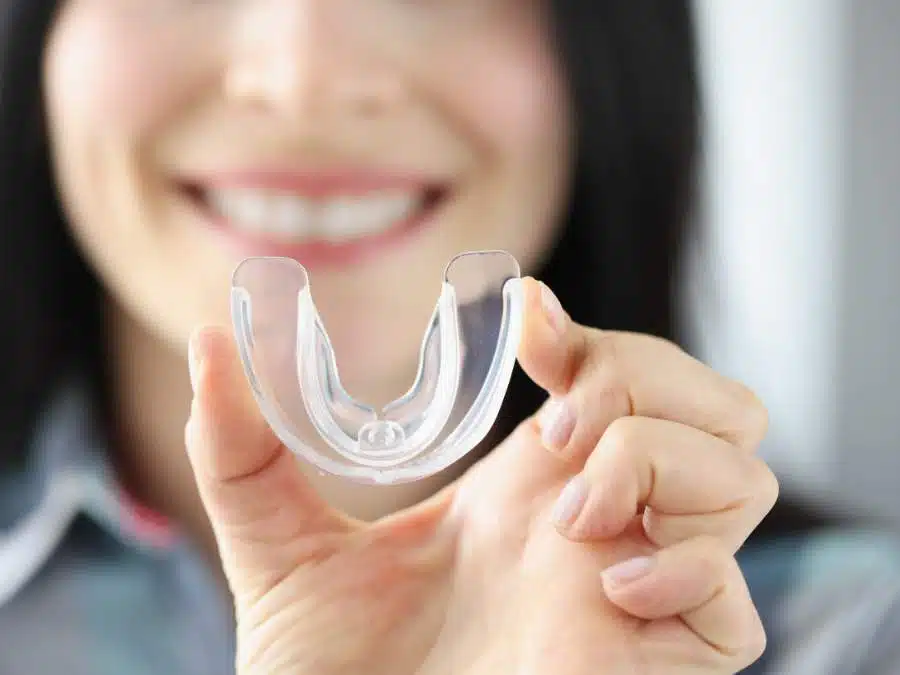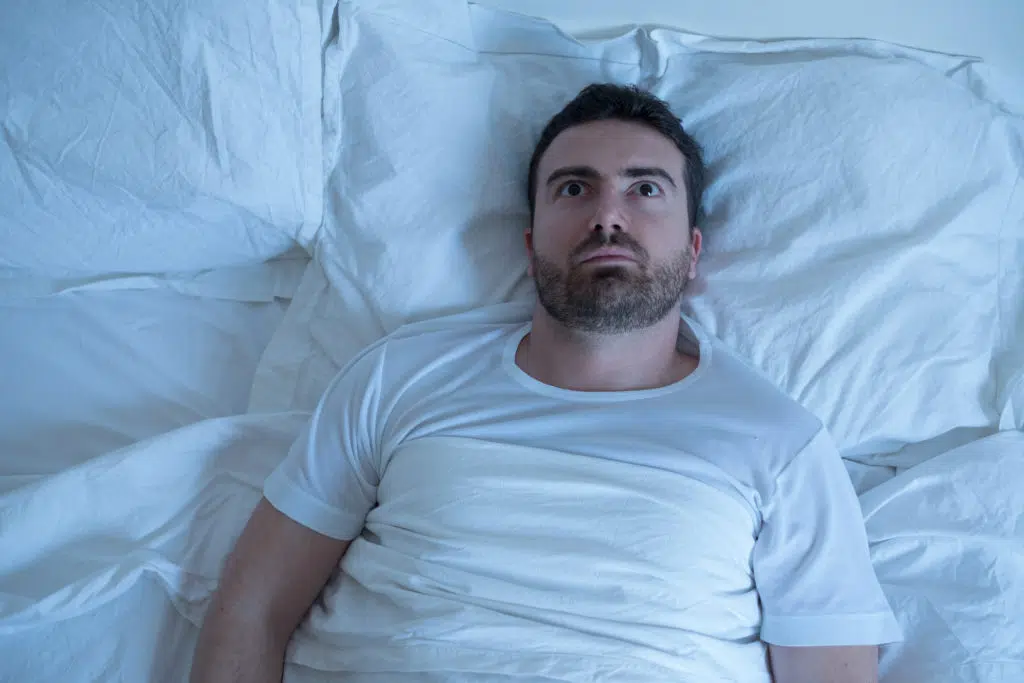You Deserve a Full Night’s Sleep!
Do you consistently wake up feeling groggy, irritable, or exhausted – even when you have had a full 8 hours of sleep? You may be suffering from obstructive sleep apnea. To treat it, our dentist in Garland, TX, offers simple, non-invasive sleep apnea treatment using custom-created mouthguards.
What is Obstructive Sleep Apnea?
When you are asleep, your whole body goes into a deep state of relaxation. However, if you suffer from obstructive sleep apnea (OSA) your throat, soft palate, and/or tongue relax too much. They will start to sag, blocking the path of air through your windpipe. As a result, you will wake up each time this happens. Although you will sometimes jolt awake with a sharp gasp, more often, you will not even know that you have moved into a lighter sleep cycle. What you will be aware of is how exhausted you feel in the morning.
Symptoms of Sleep Apnea
Because you may not be aware of the disruptions to your sleep, it can sometimes be difficult to diagnose sleep apnea. If you experience any of the following symptoms, you should schedule a sleep apnea evaluation with Dr. Dooley as soon as possible:
- Loud snoring
- Chronic exhaustion or daytime fatigue
- Frequent headaches, particularly in the morning
- Irritability or mood swings
- Forgetfulness or difficulty concentrating
- Sore throat or dry mouth when you wake up in the morning
Causes of Sleep Apnea
- Neck circumference. A thicker neck can lead to narrower airways, which can cause sleep apnea. This is the only way to prevent sleep apnea.
- Obesity. Both men and women are at greater risk for sleep apnea when they are overweight. Obstructive fat deposits in your upper airway can cause problems with your breathing and lead to sleep apnea.
- A narrowed throat. It is not your fault. This is simply how your body evolved genetically. A narrow airway may be a contributing factor to sleep apnea. Children are more likely to have a blocked airway due to enlarged tonsils or adenoids.
- Being male. Sorry guys! Sleep apnea is more common in men than it is in women, and can be as severe as 2 to 3 times more common in men. Women are more likely to have sleep apnea when they are overweight and after menopause. Your age could also play a role.
- Being older. We found that patients over 50 are more likely to suffer from sleep apnea at Copperas Cove. Obstructive sleep apnea is caused by the loss of muscle retention as you age.
- Alcohol and sedatives. Your sleep apnea can be aggravated by substances that relax your body. Sleep apnea is when your breathing becomes restricted by the muscles at the back of the throat. These substances can relax your throat muscles, which can lead to obstructive sleeping apnea.
- Smoking. You’re right if you are wondering if smoking causes sleep apnea. Obstructive sleep apnea is two to three times more common in smokers than it is for non-smokers. Smoking increases inflammation and fluid retention in your upper airway which can lead to sleep apnea.
- Nasal congestion. You are more likely to have obstructive sleeping apnea if you have trouble breathing through your nose. Excessive mouth breathing is caused by air not passing through the nasal passages.
- Conditions that could cause sleep apnea. Congestive heart disease, high blood pressure, Parkinson’s disease, and Parkinson’s disease are all possible causes. Sleep apnea can also be caused by hormonal disorders, chronic lung diseases like asthma, or a stroke.
Risks of Not Treating Sleep Apnea
Sleep apnea treatment will not only alleviate the symptoms mentioned above. It can also have untold benefits on your overall physical health. OSA has been linked to serious health concerns, including:
- High blood pressure. Sleep apnea can worsen high blood pressure. Sleep apnea is a condition that causes you to wake up several times per night due to a lack of oxygen. This creates stress at a time when you should be relaxing. This can cause your blood pressure to rise by triggering your body’s hormone system. This can lead to oxygen levels in your blood dropping when you are unable to breathe naturally.
- An increased risk for heart attack or stroke. Obstructive sleep apnea can make it more likely that you will have a heart attack. Low oxygen circulation can cause this. This condition can also cause strokes and atrial fibrillation, which is a rapid, fluttering pulse. Obstructive sleep disorder apnea can cause your body to take in oxygen in a way that makes it difficult for your brain to control blood flow in your arteries.
- Diabetes/Weight gain. This is a Catch 22 situation. Extra pounds can increase your chances of developing sleep apnea, and this condition also makes it more difficult to lose weight.
- An increased risk for car accidents. When you are not well-rested, the risk for accidents to occur increases significantly as your body is less alert.
In addition, sleep apnea impacts both your professional and personal life. Chronic exhaustion and irritability can take a huge toll on your work performance and relationships with others.
Dr. Scott Dooley’s Approach To Sleep Apnea Treatment
In most cases, we can provide sleep apnea treatment without CPAP machines using small, individually fabricated mouthguards. Some devices work much like oral splints used to treat TMJ Disorder. They will realign your jaw to tighten your soft tissues so that they do not slacken and block airflow. Other devices will actually reposition your tongue to keep your airways clear. If you are like most patients, you will quickly adjust to your device, and you will soon be enjoying the full night’s sleep that you need.
What To Expect
Dr. Scott Dooley‘s approach to treating sleep apnea primarily involves the use of oral appliance therapy. This method is especially suited for patients with mild to moderate obstructive sleep apnea or for those who cannot tolerate CPAP (Continuous Positive Airway Pressure) therapy. Here’s a breakdown of what a patient can expect during treatment:
- Initial Consultation and Evaluation: The treatment begins with a thorough evaluation. Dr. Dooley will assess the patient’s medical history, symptoms, and severity of sleep apnea. This may involve a sleep study or a review of results from a previously conducted study.
- Customization of the Oral Appliance: Once diagnosed and if suitable for oral appliance therapy, Dr. Dooley will take impressions of the patient’s teeth. These impressions are used to create a custom-fitted oral appliance, which is designed to hold the lower jaw slightly forward. This slight adjustment helps keep the airway open during sleep, reducing sleep apnea episodes.
- Fitting and Adjustment: When the oral appliance is ready, the patient will have a fitting session. Dr. Dooley will ensure that the appliance fits comfortably and make any necessary adjustments. He will also provide instructions on how to use and care for the appliance.
- Follow-Up Appointments: Regular follow-up appointments are crucial. These appointments allow Dr. Dooley to monitor the patient’s progress and make any adjustments to the appliance as needed. He will also address any discomfort or issues the patient might be experiencing.
- Effectiveness Evaluation: Over time, Dr. Dooley will evaluate the effectiveness of the treatment. This might involve asking the patient about their symptoms, quality of sleep, and any changes in their daytime sleepiness. In some cases, another sleep study might be conducted to objectively measure the treatment’s effectiveness.
- Long-Term Care and Maintenance: Oral appliance therapy may require long-term care. Dr. Dooley will guide the patient on how to maintain the appliance and monitor for any dental changes or side effects.
It’s important to note that while oral appliance therapy is effective for many patients, it is not suitable for everyone. Dr. Dooley will work closely with each patient to determine the most appropriate treatment plan for their specific needs.
Frequently Asked Questions
Q: What is sleep apnea, and how is it diagnosed?
A: Sleep apnea is a sleep disorder characterized by pauses in breathing or periods of shallow breathing during sleep. It’s typically diagnosed through a sleep study that monitors breathing, oxygen levels, and other vital signs while sleeping.
Q: What is oral appliance therapy, and how does it work?
A: Oral appliance therapy involves wearing a custom-fitted dental device during sleep. This appliance helps keep the airway open by positioning the jaw forward, thereby reducing breathing interruptions caused by sleep apnea.
Q: Is oral appliance therapy effective for all types of sleep apnea?
A: Oral appliance therapy is most effective for mild to moderate obstructive sleep apnea. It’s less effective for severe cases or central sleep apnea, which require different treatment approaches.
Q: How is the oral appliance fitted?
A: The appliance is made using impressions of the patient’s teeth and is adjusted by a specialist to ensure it fits comfortably and positions the jaw to keep the airway open.
Q: Are there any side effects of using an oral appliance?
A: Some patients may experience jaw discomfort, teeth shifting, or changes in bite alignment. Regular follow-up appointments are essential to address these issues.
Q: How long does it take to see improvements in sleep apnea symptoms?
A: Improvements can often be noticed within a few days to weeks of starting treatment, but this varies based on the condition’s severity and the individual’s response.
Q: Can oral appliance therapy be used in conjunction with other treatments?
A: Yes, oral appliance therapy can sometimes be used alongside other treatments like CPAP or lifestyle changes for enhanced effectiveness.
Q: How do I care for my oral appliance?
A: Care involves regular cleaning with a soft brush and mild soap, avoiding hot water, and proper storage when not in use.
Q: Will I need to use the oral appliance indefinitely?
A: Sleep apnea is often a chronic condition, so long-term or indefinite use of the appliance may be necessary, although individual needs vary.
Q: How often do I need to follow up with my Garland dentist?
A: Regular follow-up appointments with Dr. Dooley are crucial to monitor treatment effectiveness, make adjustments, and check for side effects or dental changes.
We Provide Sleep Apnea Treatment in Garland, TX!
To alleviate chronic snoring or obstructive sleep apnea, find out if Dr. Dooley can help you with a custom-designed oral appliance. Schedule an appointment by calling Scott Dooley Dentistry in Garland, TX, today at 972-495-8100. We also proudly serve the residents of Dallas, Richardson, Wylie, Sachse, and all surrounding communities.


